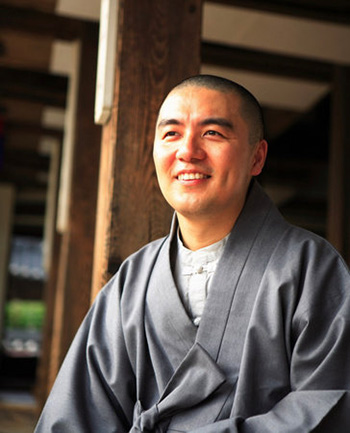What is the theme of your teaching for January’s Meditation Month? The theme is about realizing our true nature through Zen koan meditation. Our nature is boundless, luminous, and nondual. It already contains all the qualities we long for including freedom, happiness, abundance, love, and creativity.
Although we have never been apart from the destination of our seeking, we imagine that we must leave our true home and strive endlessly. In this way, we overlook what is already here and picture awakening as something extraordinary, far removed from what is.
Each week we will sit with a new koan. Its purpose is to bring the restless mind to rest and help us rediscover our inherent true nature. As this becomes clear, we see that the prison we once believed in was made only of our thoughts, and that the door has been open all along.
What led you to enter monastic training? Ever since I was young, I have felt a deep longing to discover who we really are and why we are here on earth. This earthly dwelling often felt foreign to me, and it was strange to watch adults behave like children. Being forced to take sides and antagonize others seemed equally absurd, whether it was in the name of country, religion, politics, or gender.
Buddhist teachings stood out to me because they explain how our attachment leads to suffering. Rather than placing blame on the world or on others, they point to the mind as the real cause of suffering, since it resists what is and longs for what is not. This insight led me to study Buddhism more deeply and to seek my own direct experience, which eventually brought me to monastic training.
You’ve spoken about the importance of pausing and slowing down. What practical steps can we take to support those who feel overwhelmed by the pace of life today? The first step is to notice the current state of our being. If we feel overwhelmed or stressed, simply being aware of that feeling is perhaps the most important step. Once we know, we can begin to ease the pressure.
If we have only ten seconds, I suggest smiling. It instantly brightens our mood and relaxes us. If you have one or two minutes, enjoy the simple pleasure of taking a deep breath. As you breathe out, notice the soothing sensations it leaves in the body. Savor them.
If you have fifteen to thirty minutes, make yourself a coffee or tea and listen to your favorite music. Take time to enjoy the process—brewing, smelling the aroma, taking the first sip, and noticing how it feels different from the second or third sip.
If you have forty to sixty minutes, take a walk in nature. Walking helps us let go of stressful thoughts and naturally restores balance to the body and mind.
What are some practical ways to build stronger connections with other people, even when we feel busy or misunderstood? One easy and practical way is to invite them for coffee, tea, or a meal. When we are met with generosity, we become more open-minded and willing to listen. Sharing food or drink creates a simple space where walls begin to come down and understanding can grow. Even small gestures of care can open the door to deeper trust and connection. If you can cook a meal for them, rather than meeting in a restaurant, it can feel even more personal, showing that you are willing to invest time and energy in the relationship.
Another simple way is to practice attentive listening. Instead of preparing what to say next, give your full attention to the other person. Let them feel truly heard. When someone senses that you are genuinely present with them, it deepens the bond and creates a foundation of trust, even without many words.
What part of the teachings do your students struggle with the most? Students often struggle with the fact that we are already at our destination. We are so accustomed to the law of cause and effect that we imagine hard work and greater effort will bring success in our spiritual practice. Instead of relaxing into what is, we tense up and try to move away from the present moment, imagining some fantastical enlightenment experience in the future.
But what we are seeking is our own true nature, not someone else’s. It is already within us. Our task is not to create a new state but to recognize what we have overlooked. The path is one of loosening our tight grip and noticing what has been in our hand all along rather than tightening it with all our might and effort.
In January 2026, Haemin Sunim will lead Tricycle’s annual Meditation Month.
Thank you for subscribing to Tricycle! As a nonprofit, we depend on readers like you to keep Buddhist teachings and practices widely available.
